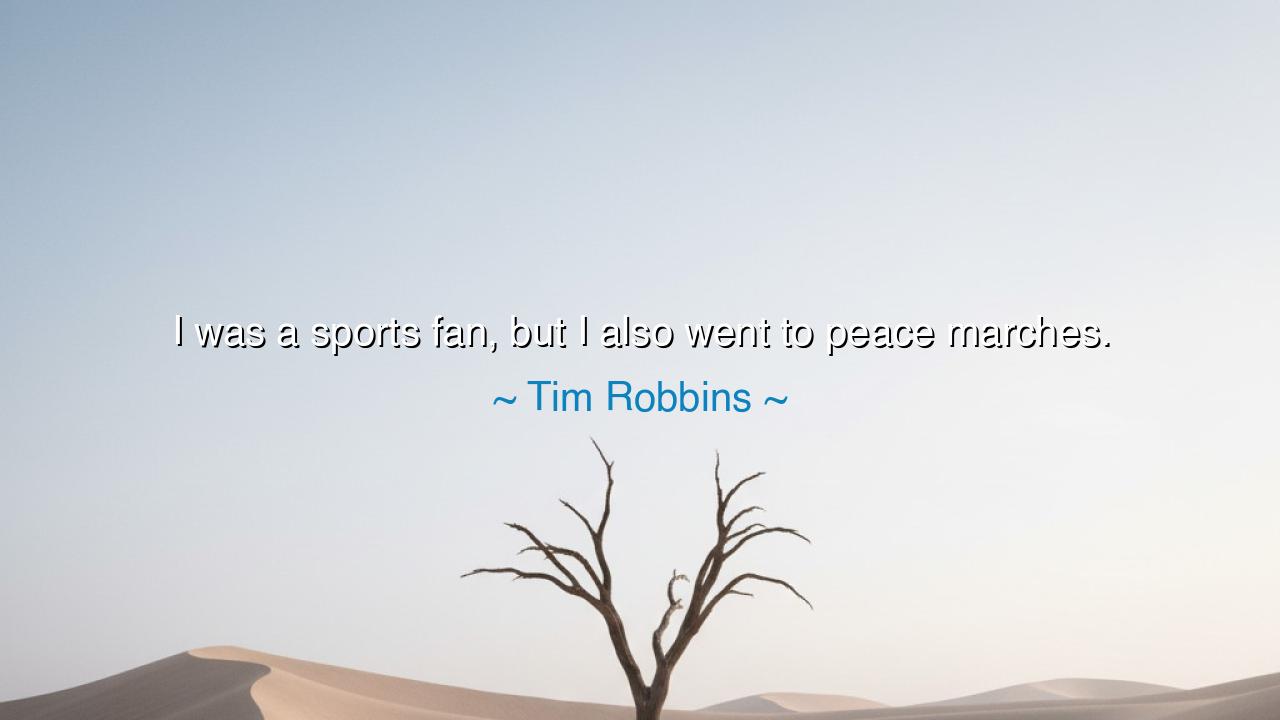
I was a sports fan, but I also went to peace marches.






Hear the words of Tim Robbins, who declared with humility and conviction: “I was a sports fan, but I also went to peace marches.” At first, this confession seems simple, the memory of a man torn between cheering in stadiums and walking in the streets. Yet within it lies the profound truth of human wholeness—that the soul is vast enough to love both contest and compassion, both the roar of competition and the cry for justice.
When Robbins calls himself a sports fan, he invokes the image of the arena: the gathering of thousands, the clash of bodies and wills, the joy of victory, and the sorrow of loss. In such places, people learn loyalty, endurance, and the ecstasy of shared passion. To love sport is to love the human struggle distilled into its purest form. But he does not let this love consume him entirely, for he reminds us that man is more than a spectator of games—he is also a citizen of the world.
Thus he adds, “I also went to peace marches.” Here, the arena is exchanged for the street, the scoreboard for the placard, the cheer for the chant. In the peace march, the human heart seeks not victory over an opponent, but harmony among all. It is the recognition that beyond the thrill of competition lies a deeper calling: to use strength not for conquest, but for reconciliation, to raise the voice not only in celebration, but in protest against injustice and war.
History bears witness to such duality. Recall the figure of Muhammad Ali, who thrilled the world as a champion in the boxing ring yet stood boldly against the Vietnam War, sacrificing titles and fortune for the sake of conscience. He, like Robbins, showed that one can embrace the fire of sports and still march for peace, that the roar of the crowd need not drown out the cry of the oppressed. Such men teach us that passion for play and passion for justice are not enemies, but companions.
The deeper meaning of Robbins’ words is that identity is never singular. The world often seeks to confine us to one box—fan, athlete, activist, thinker. But the truth is richer: the human soul contains multitudes. One may rejoice in the friendly rivalries of sports, and the next day stand shoulder to shoulder with strangers, demanding peace. To be fully alive is to honor every part of one’s nature—the part that plays, the part that cheers, the part that weeps, and the part that fights for what is right.
The lesson for us is clear: do not let the world tell you that your loves must contradict each other. You can delight in games and still grieve for war. You can wear the colors of your team and also raise the banner of peace. Do not reduce yourself to fragments; live fully, embracing both joy and justice, both play and purpose. For this balance is the mark of wisdom.
The practical action is this: find harmony in your own life between the pursuits of pleasure and the call of conscience. Enjoy the sports, the arts, the entertainments that lift the heart—but do not forget the marches, the causes, the labors that heal the world. Walk in both arenas, and you will discover that life is richest when the cheer of the stadium and the cry of the street flow together in one great song.
Thus, Robbins’ words endure as a testament to balance: that we may love the beauty of the game, yet still march for the beauty of peace. To live fully is to honor both, for in this way, we become not fragments of humanity, but its wholeness.






AAdministratorAdministrator
Welcome, honored guests. Please leave a comment, we will respond soon